FFA officer positions in order, a topic that sparks intrigue and excitement among those seeking to lead and make a difference. This comprehensive guide delves into the intricacies of each position, providing a roadmap for aspiring officers to navigate the path to success.
From the President to the Sentinel, each FFA officer plays a vital role in shaping the organization’s direction and inspiring its members. Their responsibilities encompass a wide range of tasks, from planning events and managing finances to representing the FFA at various functions.
Officer Positions
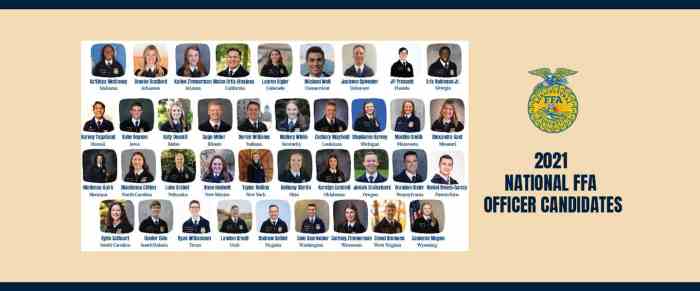
The Future Farmers of America (FFA) is a national organization dedicated to preparing students for leadership and careers in the agricultural industry. FFA officers play a vital role in leading their chapters and representing the organization at the local, state, and national levels.
There are several officer positions within the FFA, each with its own set of responsibilities. These positions include:
President
- Presides over all FFA meetings and activities.
- Appoints committee chairs and members.
- Represents the chapter at local, state, and national events.
Vice President
- Assists the president in carrying out their duties.
- Presides over meetings in the absence of the president.
- Serves as the chapter’s historian.
Secretary
- Keeps accurate records of all FFA meetings and activities.
- Maintains the chapter’s correspondence.
- Prepares reports and other documents as needed.
Treasurer
- Manages the chapter’s finances.
- Prepares financial reports.
- Conducts audits as needed.
Reporter
- Publicizes FFA activities through social media, the school newspaper, and other channels.
- Creates and maintains the chapter’s website.
- Takes photographs and videos of FFA events.
Sentinel
- Maintains order at FFA meetings and activities.
- Greets visitors and guests.
- Assists with the chapter’s fundraising efforts.
Officer Selection
The selection of FFA officers is a crucial process that ensures the smooth functioning and leadership of the organization. The process involves evaluating candidates based on specific criteria and providing training and development opportunities to equip them for their roles.
Evaluation Criteria, Ffa officer positions in order
- Academic Performance:Candidates should maintain a satisfactory academic record, demonstrating their commitment to education.
- Leadership Skills:Candidates should possess strong leadership qualities, including the ability to inspire, motivate, and delegate.
- Communication Skills:Candidates should be effective communicators, able to convey ideas clearly and persuasively.
- FFA Involvement:Candidates should have an active involvement in FFA activities, demonstrating their dedication to the organization.
- Personal Character:Candidates should exhibit integrity, responsibility, and a strong work ethic.
Officer Training and Development
Once officers are selected, they undergo training and development programs to enhance their leadership skills and knowledge of FFA procedures. These programs provide officers with the tools and resources they need to effectively fulfill their responsibilities.
Officer Roles
FFA officers play a vital role in representing the organization and leading its members. They are responsible for upholding the FFA’s mission and values, as well as promoting agricultural education and FFA activities within their chapters and communities.Officers serve as ambassadors for the FFA, representing the organization at various events and functions.
They are expected to conduct themselves in a professional and ethical manner, reflecting positively on the FFA and its members. Through their leadership and involvement, officers inspire and motivate other members to actively participate in FFA programs and activities.
FFA officer positions are typically filled in a specific order, with the president at the top and the sentinel at the bottom. However, there is one notable exception to this rule: the historian. The historian is responsible for documenting the chapter’s activities and accomplishments, and as such, they are often appointed rather than elected.
This is because the historian needs to have a strong understanding of the chapter’s history and be able to write clearly and concisely. For more information on bipolar 1 disorder, please refer to this bipolar 1 disorder case study .
Officer Leadership and Motivation
Effective FFA officers possess strong leadership qualities and the ability to motivate others. They set a positive example for their fellow members, demonstrating enthusiasm and commitment to the organization. Officers create a welcoming and inclusive environment, encouraging all members to participate and contribute their ideas.By
organizing engaging activities, recognizing member achievements, and providing opportunities for personal growth, officers foster a sense of belonging and camaraderie within their chapters. They empower members to take on leadership roles and develop their own skills, preparing them for future success in agriculture and beyond.
Officer Collaboration and Teamwork
Collaboration and teamwork are essential for successful FFA officer teams. Officers work together to plan and implement chapter activities, set goals, and address challenges. They share responsibilities, support each other’s efforts, and respect diverse perspectives.By working as a cohesive unit, officers create a strong and effective leadership team that can accomplish more than the sum of its individual members.
They model the importance of cooperation, communication, and consensus-building, setting an example for the entire chapter.
Officer Succession
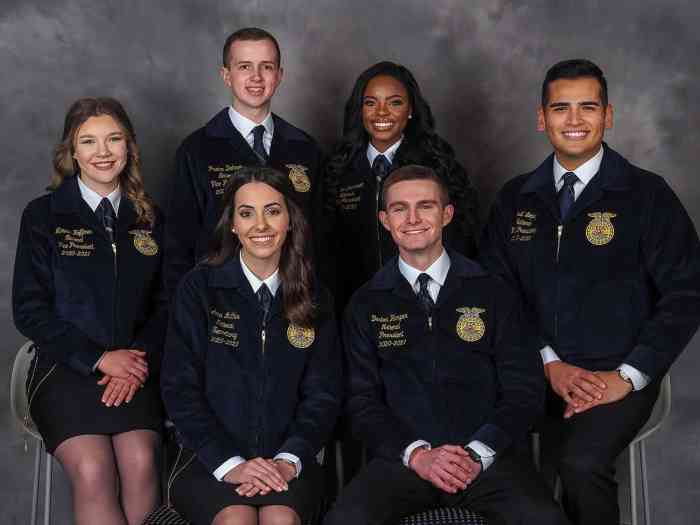
Officer succession is the process of transitioning between officer teams, ensuring a smooth handover of responsibilities and knowledge. This process involves careful planning and effective mentorship to empower the incoming team to lead effectively.
Importance of Mentorship and Knowledge Transfer
Mentorship is crucial for officer succession. Experienced officers can guide and support incoming officers, sharing their knowledge, skills, and insights. This helps to ensure continuity in leadership and institutional memory.
Strategies for Ensuring a Smooth Transition of Leadership
To ensure a smooth transition of leadership, consider the following strategies:
- Establish a formal succession plan that Artikels the process for officer transitions.
- Provide ongoing training and development opportunities for officers to prepare them for leadership roles.
- Create opportunities for incoming officers to shadow and work alongside experienced officers.
- Establish a system for documenting institutional knowledge and procedures to facilitate knowledge transfer.
Officer Responsibilities
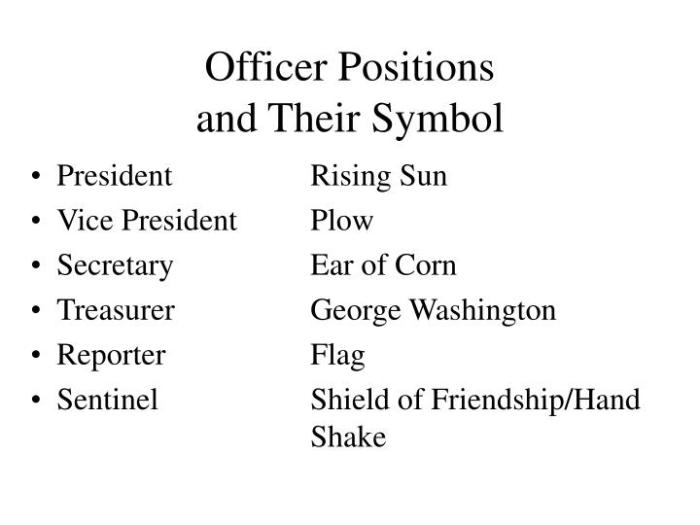
FFA officers play a crucial role in the success of their chapters. They are responsible for planning and executing activities, managing finances, and representing the chapter to the community. Their responsibilities can be broadly categorized into administrative, financial, and outreach duties.
These responsibilities contribute to the success of the FFA chapter by ensuring that it runs smoothly and efficiently, that it has the resources it needs to succeed, and that it is well-represented in the community.
Administrative Responsibilities
- Plan and organize chapter meetings and activities
- Take minutes at chapter meetings
- Maintain chapter records and documents
- Communicate with chapter members and the community
- Represent the chapter at FFA events and activities
Financial Responsibilities
- Manage the chapter’s budget
- Track chapter expenses and income
- Prepare financial reports
- Fundraise for the chapter
- Invest chapter funds
Outreach Responsibilities
- Promote FFA to the community
- Recruit new members to the chapter
- Organize community service projects
- Represent the chapter at community events
- Partner with other organizations to promote FFA
Officer Development: Ffa Officer Positions In Order
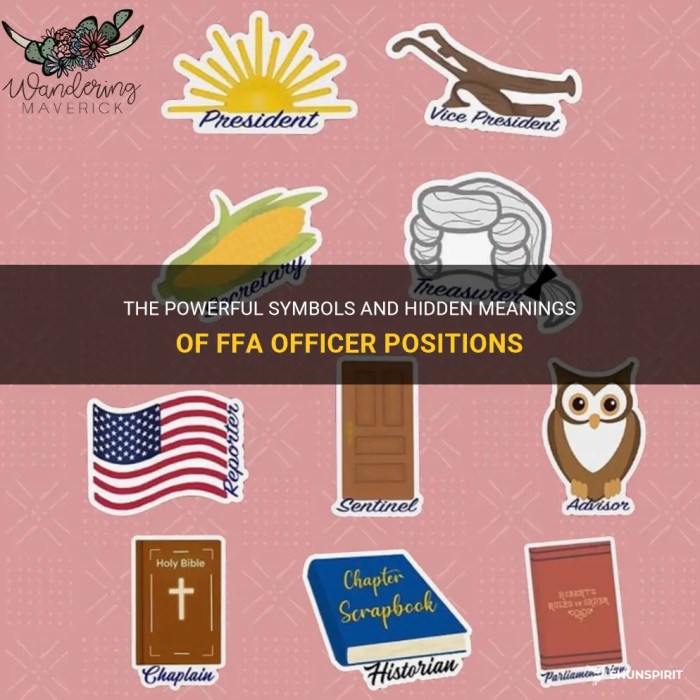
FFA officers have ample opportunities to enhance their leadership skills through a variety of training programs, workshops, and conferences. These initiatives provide a platform for officers to refine their communication, decision-making, problem-solving, and team-building abilities.
Continuous professional development is crucial for officers to stay abreast of best practices and emerging trends in agricultural education and leadership. It enables them to effectively guide their chapters and contribute meaningfully to the FFA organization.
Training Programs
- National FFA Officer Leadership Training Conference (OLTC): A week-long event that provides intensive leadership training for newly elected national officers.
- State FFA Officer Leadership Training (SOLT): Similar to OLTC, but conducted at the state level for state officers.
- Chapter Officer Leadership Training (COLT): Training specifically designed for chapter officers to develop their skills in planning, organizing, and conducting chapter activities.
Workshops
- FFA Leadership Workshops: Focused on specific leadership topics, such as communication, conflict resolution, and parliamentary procedure.
- Agricultural Education Workshops: Provide officers with knowledge and skills related to agricultural education, including curriculum development and instructional methods.
Conferences
- National FFA Convention & Expo: The largest annual gathering of FFA members, where officers participate in leadership workshops, competitions, and networking opportunities.
- State FFA Conventions: Similar to the National Convention, but held at the state level.
- Regional FFA Leadership Conferences: Bring together officers from multiple states for leadership development and networking.
Officer Recognition
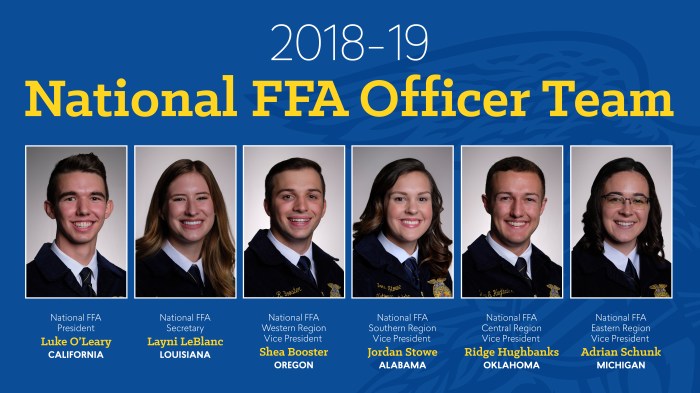
FFA officers deserve recognition for their hard work and dedication to the organization. There are several ways in which officers are recognized for their contributions, including awards, scholarships, and other forms of recognition.
One of the most prestigious awards that an FFA officer can receive is the National FFA Officer Award. This award is given to the top officer in each of the six FFA regions. Officers who receive this award are recognized for their outstanding leadership, service, and dedication to the FFA.
In addition to the National FFA Officer Award, there are several other awards that FFA officers can receive. These awards include the State FFA Officer Award, the District FFA Officer Award, and the Chapter FFA Officer Award. These awards are given to officers who have demonstrated outstanding leadership and service at the state, district, and chapter levels.
FFA officers are also eligible for a variety of scholarships. These scholarships are awarded to officers who have demonstrated financial need and academic achievement. Some of the most prestigious FFA scholarships include the National FFA Scholarship, the State FFA Scholarship, and the District FFA Scholarship.
In addition to awards and scholarships, FFA officers are also recognized through other forms of recognition. These forms of recognition include being featured in FFA publications, being invited to speak at FFA events, and being given the opportunity to travel to FFA conferences and workshops.
It is important to acknowledge and celebrate the achievements of FFA officers. By recognizing their hard work and dedication, we can encourage them to continue to serve the FFA and to make a positive impact on the lives of others.
Awards
- National FFA Officer Award
- State FFA Officer Award
- District FFA Officer Award
- Chapter FFA Officer Award
Scholarships
- National FFA Scholarship
- State FFA Scholarship
- District FFA Scholarship
Other Forms of Recognition
- Being featured in FFA publications
- Being invited to speak at FFA events
- Being given the opportunity to travel to FFA conferences and workshops
Key Questions Answered
What are the qualifications for becoming an FFA officer?
To become an FFA officer, students must meet certain criteria, such as academic standing, leadership experience, and involvement in FFA activities.
How are FFA officers selected?
FFA officers are typically elected by their peers through a democratic process that involves campaigning and voting.
What are the benefits of being an FFA officer?
Being an FFA officer provides numerous benefits, including leadership development, public speaking skills, and opportunities for personal growth.